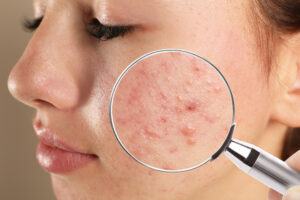What is Eczema 
Itchy skin, dry skin, rashes, scaly patches, blisters, and infections are all symptoms of eczema (eg-zuh-MUH). Eczema’s most common symptom is itchy skin. Atopic dermatitis, contact dermatitis, dyshidrotic eczema, nummular eczema, seborrheic dermatitis, and stasis dermatitis are all forms of eczema. Eczema affects more than 31 million people in the United States. Adults and adolescents alike may be affected by mild to severe forms of eczema. Within the first few weeks and months of life, newborn babies can develop eczema. Dry, itchy patches of skin in children with eczema may lead to blisters and infections from scratching, which can aggravate the condition further. In the context of eczema, many people use the term “flare-up” to refer to a period of eczema in which they are experiencing one or more acute symptoms or side effects due to prolonged itchiness. Dermatologists, dermatologists, and the American Academy of Dermatology all recommend a variety of treatments for eczema, including moisturizers, antihistamines, topical steroid creams, and corticosteroids (AAD).
An overactive immune system causes the skin barrier to become dry and itchy, resulting in atopic dermatitis, the most common type of eczema (also known as “atopic eczema”). Eczema is not spread by contact. It’s not something you can “catch” from another person. A genetic and environmental interaction is thought to be at the root of the condition, but no one knows for sure. Many people with eczema also have hay fever, allergic asthma, or food allergies as a result of their eczema. Eczema can be prevented and controlled only through the use of proper, consistent skin care.
Causes of Eczema
Eczema can be caused by a variety of factors, including a genetic predisposition that is amplified by the environment. A flare-up occurs on the skin’s surface when an irritant or allergen from outside or inside the body “switches on” the immune system. The common symptoms of eczema can be attributed to this type of inflammation. Irritation can result from skin crevices, particularly in the flexural areas behind the knees, elbows, lower legs, and other areas of the body that rub together. Eczema may also have a genetic component that includes a protein called “filaggrin” that helps keep your skin moist; a deficiency in this protein can cause dry, itchy skin. An allergic reaction triggered by common household items can lead to a flare-up of eczema symptoms. Additionally, eczema may be triggered by:
- extended exposure to dry air, extreme heat, or cold
- some types of soap, shampoo, bubble bath, body wash, facial cleansers
- laundry detergents and fabric softeners with chemical additives
- certain fabrics like wool or polyester in clothing and sheets
- surface cleaners and disinfectants
- natural liquids like the juice from fruit, vegetables, and meats
- fragrances in candles
- metals, especially nickel, in jewelry or utensils
- formaldehyde, which is found in household disinfectants, some vaccines, glues, and adhesives
- isothiazolinone, an antibacterial found in personal care products like baby wipes
- Cocamidopropyl betaine, which is used to thicken shampoos and lotions
- paraphenylenediamine, which is used in leather dyes and temporary tattoos
Eczema flare-ups can also be triggered by emotional stress, but it’s not clear why. Eczema flare-ups and symptoms can worsen in some people when they are “stressed.” A person’s skin may flare up just because they know they have eczema.
Symptoms of Eczema
Everyone’s eczema and symptoms are unique, so the most important thing is to remember this. The affected areas of the skin will be affected differently by each person’s skincare routine. When it comes to your eczema, you may not see the same symptoms in yourself as you do in someone else. Different types of eczema can appear in different parts of the body at different times, and even in different affected areas of the body themselves. Though they are not the same conditions, eczema and psoriasis share some symptoms.
Itchy skin is a common symptom of eczema. Itching is referred to as “pruritus” in medical terminology. The itching may be mild to moderate for a large percentage of the population. The itch can get so bad that people end up scratching it so hard that it hurts. The “itch-scratch cycle” is a term for this phenomenon.
Symptoms of eczema often include:
- Itch;
- Dryness, sensitive skin;
- Inflamed, discolored skin;
- Rough, leathery, or scaly skin, appearing as scaly patches;
- Oozing or crusting;
- Areas of swelling.
Is there Eczema
Eczema can be treated, but there is no cure. Each patient’s eczema symptoms should be taken into consideration when developing a treatment plan. Medical-grade moisturizing creams, prescription topical medications, including topical corticosteroids, over-the-counter (OTC) remedies, phototherapy, immunosuppressants, and injectable biologics may all be options, depending on your age and the severity of your eczema. Natural and alternative treatments for eczema, such as bleach baths, cryotherapy, medical-grade honey, meditation, and acupuncture, can also help some sufferers.
NHCC- National HealthCare Center, GA; Treatment for eczema Stockbridge GA
Your doctor may have a list of dermatologists he or she recommends for you. You can also use Medicare.gov’s physician finder tool to locate a Medicare dermatologist. You can use this tool to find nearby dermatologists who accept Medicare. To find a list of in-network dermatologists if you have Medicare Advantage, you can either visit the insurance provider’s website or call the company directly. Contact us today at NHCC- National HealthCare Center, GA, we accept many forms of major insurance.

